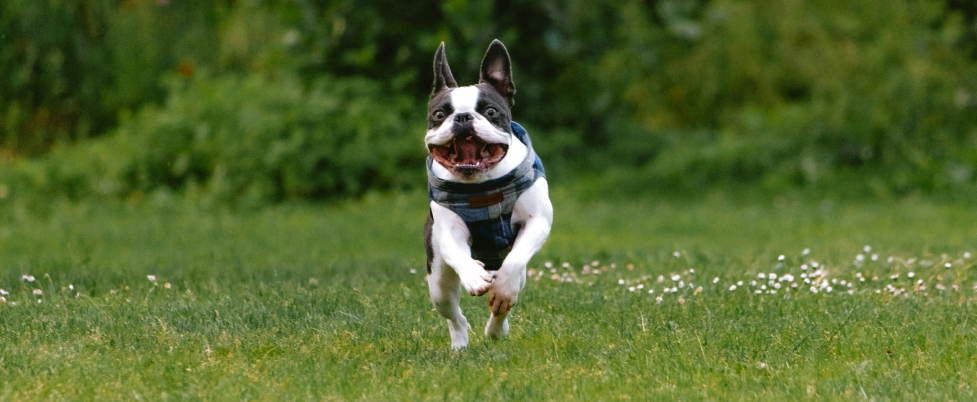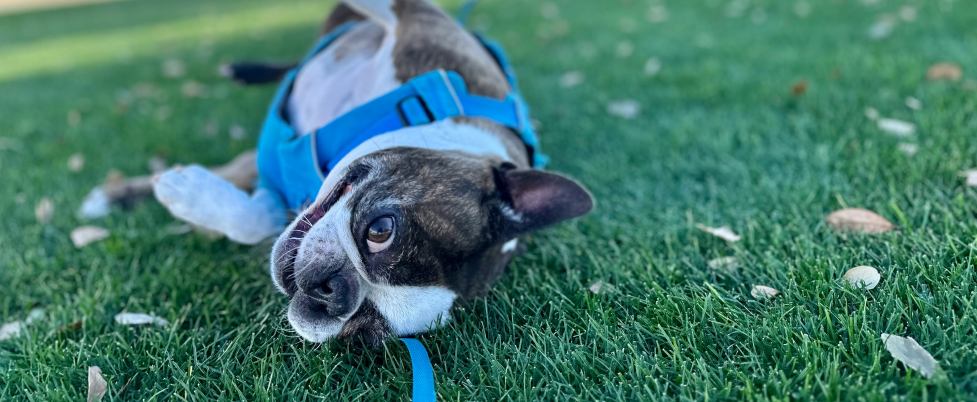LIFE STAGES OF A BOSTON TERRIER / ADULT LIFE

Disclaimer: I am not a veterinarian. Always consult your vet before making changes to your dog’s exercise routine or health regimen.
The Importance of Exercise for Your Boston Terrier
Why Exercise Matters
Regular exercise is essential for keeping your Boston Terrier healthy, happy, and well-behaved. Proper physical activity:
Why Exercise Matters
- Maintains a healthy weight, reducing the risk of obesity-related health issues.
- Prevents boredom and destructive behaviors, such as chewing or excessive barking.
- Supports cardiovascular and muscular health, keeping their heart strong and joints flexible.
Understanding Boston Terriers’ Energy Levels
Boston Terriers are a medium-energy breed that thrives on both physical activity and mental stimulation.
- 🐶 They have short bursts of playfulness, so exercise routines should be engaging but not too strenuous.
- 🐶 Their needs may vary based on age, health conditions, and individual temperament—some Bostons are naturally more active than others.
- 🐶 Due to their brachycephalic (short-nosed) nature, they can be prone to breathing difficulties, so exercise should be moderate and carefully monitored, especially in hot weather.
Daily Exercise Needs for Adult Boston Terriers
How Much Exercise Does an Adult Boston Need?
To keep your Boston Terrier healthy and mentally stimulated, aim for 30 to 60 minutes of physical activity daily. Since they have short bursts of energy, it’s best to:
- Break exercise into multiple shorter sessions (e.g., two 15–30 minute walks or playtimes).
- Mix structured activities (like walks or fetch) with free play to keep things engaging.
- Adjust exercise intensity based on your Boston’s age, health, and endurance.
Signs of an Under-Exercised Boston Terrier
If your Boston Terrier isn’t getting enough activity, they may show signs of boredom or frustration, such as:
- Weight gain, leading to potential health problems.
- Restlessness or hyperactivity indoors, including zoomies at odd hours.
- Destructive behaviors, such as chewing furniture, digging, or excessive barking.
Keeping your Boston on a consistent exercise schedule helps prevent these issues and ensures they stay happy and well-behaved.
Fun & Effective Exercise Ideas
Daily Walks
- Aim for two 15–30 minute walks per day to keep your Boston Terrier active and engaged.
- Use a harness instead of a collar to prevent strain on their sensitive airway.
- Vary your route to introduce new sights and smells, keeping walks stimulating.
- Avoid excessive exercise in hot or humid weather to prevent overheating.
Playtime at Home
- Interactive games are a great way to provide exercise while strengthening your bond.
- Fetch: A classic energy-burning game—use soft or lightweight toys for safety.
- Tug-of-war: Helps build strength and satisfies their natural instincts.
- Hide-and-seek: Hide treats or toys around the house to engage their mind and body.
- Choose toys designed for small to medium-sized dogs to ensure safety and durability.
Dog Parks
- Off-leash play can help your Boston Terrier socialize and expend energy.
- Keep sessions short (15–20 minutes) to prevent overexertion.
- Watch for signs of fatigue or breathing difficulties, especially in hot weather.
- Always supervise interactions with other dogs to ensure a positive experience.
Obstacle Courses
- Agility-style courses offer both mental and physical stimulation.
- Set up tunnels, cones, small jumps, and weave poles in your yard or at a dog-friendly park.
- Use treats and positive reinforcement to guide your Boston through the courses.
- Keep it fun and low-impact, as Boston Terriers are prone to joint issues..
Considerations for Boston Terrier-Specific Needs
Breathing Concerns
- Boston Terriers are brachycephalic (flat-faced), making them prone to breathing difficulties during exercise.
- Avoid high-intensity activities that cause excessive panting.
- Watch for signs of overexertion, such as wheezing, excessive drooling, or struggling to catch their breath.
- Take frequent breaks and provide water during playtime.
Temperature Sensitivity
Boston Terriers are sensitive to extreme temperatures, requiring special care during outdoor activities.
Hot Weather Tips ☀️
- Exercise during the cooler parts of the day (early morning or evening).
- Bring water and offer frequent hydration breaks.
- Stick to shaded areas and avoid hot pavement, which can burn their paws.
- If your Boston shows signs of overheating (excessive panting, weakness, or drooling), stop activity immediately and cool them down with water.
Cold Weather Tips ❄️
- Use a dog sweater or jacket to keep your Boston warm during winter walks.
- Keep outdoor sessions shorter in freezing temperatures to prevent discomfort.
- If it’s too cold, indoor activities like tug-of-war or hide-and-seek can help burn energy.
Mental Stimulation and Enrichment
Engaging Activities for Mental Stimulation
Physical exercise is important, but keeping your Boston Terrier’s mind engaged is just as crucial for their overall well-being. Mental workouts help prevent boredom, reduce anxiety, and improve focus.
- Scent Games – Hide treats around the house or yard and encourage your Boston to sniff them out.
- Food-Dispensing Toys – Use puzzle feeders or treat balls to make mealtime more interactive.
- Training Sessions – Teach new tricks, reinforce commands, or try dog sports like agility.
- Name Recognition Game – Teach your Boston the names of different toys and have them retrieve the correct one.
Keeping Things Fresh and Exciting
- Rotate Toys – Switch out different toys every few days to maintain interest.
- Change Up Walks – Explore different routes or introduce new environments like trails or dog-friendly stores.
- Interactive Play – Games like hide-and-seek or playing “find the toy” engage both their brain and body.
Indoor Exercise Options for Rainy Days
Interactive Toys
- Use puzzle toys or treat-dispensing toys to challenge their problem-solving skills.
- Try snuffle mats to encourage foraging instincts and keep them engaged.
- Rotate different toys to prevent boredom.
Stairs and Hallways
- Play short-distance fetch down a hallway or up a few steps.
- Set up a mini obstacle course using pillows or tunnels.
- Use a soft ball or plush toy to prevent loud thuds indoors.
Training Sessions
- Reinforce basic commands (sit, stay, come) while keeping your Boston active.
- Introduce fun tricks like spinning, jumping through a hoop, or weaving through your legs.
- Practice “find it” games by hiding treats around the house for a mental and physical workout.
Monitoring Your Boston Terrier’s Health During Exercise
Signs to Watch For
Keeping an eye on your Boston Terrier’s physical condition during exercise is essential to prevent exhaustion or injury.
- Heavy Panting or Labored Breathing – Boston Terriers are a brachycephalic breed, meaning they can struggle with breathing if overexerted.
- Limping or Joint Discomfort – Watch for any hesitation in movement or favoring of a leg, which could indicate strain or injury.
- Reluctance to Continue – If your Boston suddenly slows down, lies down, or refuses to keep moving, they may be tired or overheated.
Rest and Recovery
- Provide a Cool, Comfortable Space – Let them relax in a shaded or air-conditioned area.
- Hydration is Key – Always offer fresh water after activity to prevent dehydration.
- Monitor for Ongoing Symptoms – If excessive panting, limping, or fatigue persists, consult a vet.
Conclusion: Keeping Your Boston Active and Happy
Regular exercise is essential for your Boston Terrier’s physical health, mental well-being, and overall happiness. By keeping them active, you can help prevent weight gain, reduce boredom-related behaviors, and strengthen your bond.
- Tailor Activities to Their Needs – Every Boston Terrier is unique, so adjust exercise routines based on age, health, and energy levels.
- Prioritize Safety & Comfort – Watch for signs of exhaustion or breathing difficulties, and modify activities based on weather conditions.
- Make Exercise Fun! – Whether it’s walks, playtime, or mental challenges, engaging workouts ensure a healthy and happy pup.
By committing to regular and enjoyable exercise, you’ll help your Boston Terrier live a longer, more fulfilling life! 🐾💙
Pro Tip: Consult your vet if you’re unsure how much exercise your Boston Terrier needs or if you notice any unusual behaviors during or after activity.

Other articles by this author

“Hi! I’m Weezie, a spirited Boston Terrier / French Bulldog mix and self-proclaimed expert on everything Boston.